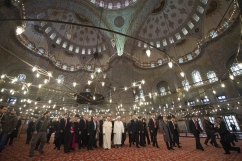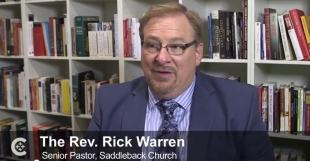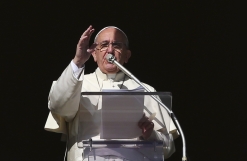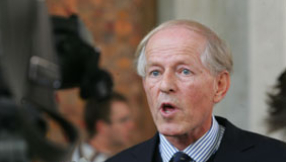Pope Francis has used an interview with Argentina's prestigious La Nacion newspaper to attack the Roman Catholic Church's 'clericalism' and to defend himself against charges that he is failing to provide the Church with clear leadership.
Asked about the numbers of Latin American Catholics leaving the Church, the Argentian Pope referred to the attractions of Protestant 'prosperity preaching', which he said had "inspired many religious propositions which people feel attracted to". However, striking a note which has become familiar since his election, he spoke of the need for clergy to reconnect with ordinary Catholics, saying: "I wonder about ourselves, what is it that we ourselves do, what is within the Church that makes the faithful unhappy? It's that people don´t feel we are close enough, it's clericalism. Today, to be close means to reach out to Catholics, to seek people out and be close to them, to sympathise with their problems, with their reality."
Asked whether the Church should do more to stop people leaving, he criticised 'managerial' approaches to the problem, saying: "I don't like to use terms connected with proselytism because that´s not the truth. I like to use the image of the field hospital: some people are very much injured and are waiting for us to heal their wounds, they are injured for a thousand reasons. We must reach out to them and heal their wounds."
He objected similarly to the word 'strategy', saying: "I'd much rather speak about the Lord´s pastoral call, otherwise it sounds like an NGO. It's the Lord's call, what the Church is asking from us today, not as a strategy, because the Church isn't into proselytism."
Traditional Catholics have criticised Pope Francis for speaking too generally about reforming the Church and failing to indentify a clear theological programme, with one senior cardinal describing the Church under his leadership as "like a ship without a rudder". Challenged on this, the Pope said: "Those expressions strike me as odd. I am not aware of anybody using them. The media quote them. However, until I can ask the people involved "Have you said this?" I will have brotherly doubts."
"Somebody did say to me once, 'Of course, of course. Insight is so good for us but we need clearer things.' And I answered, 'Look, I wrote an encyclical, true enough, it was a big job, and an Apostolic Exhortation, I'm permanently making statements, giving homilies; that's teaching. That's what I think, not what the media say that I think. Check it out, it's very clear.'"
He also spoke of the disagreements on sexuality and pastoral theology that emerged during the recent Synod on the Family, arguing that it was healthy to hear different views. "It wasn't a division against the Pope, that is, the Pope was no benchmark. Because the Pope tried to get the ball rolling and to listen to everybody. The fact that in the end my address was accepted with such enthusiasm by the synod fathers shows that the Pope is not the issue, but rather the different pastoral positions are."
Asked what he enjoyed most about being Pope, he said that before he came to Rome for the election following the retirement of Pope Benedict, he was planning his retirement. "When I came here I had to start all over again, all this was new. From the start I said to myself: 'Jorge, don't change, just keep on being yourself, because to change at your age would be to make a fool of yourself.'"
"That's why I've always kept on doing what I used to do in Buenos Aires. Perhaps even making my old mistakes. But I prefer it like this, to be myself. That evidently caused some changes in the protocols, not in the official protocols because I'm very careful about abiding by them. The thing is that I am who I am even where protocols are concerned, just as I was myself in Buenos Aires. You can see why 'not changing' suited me so well."
















